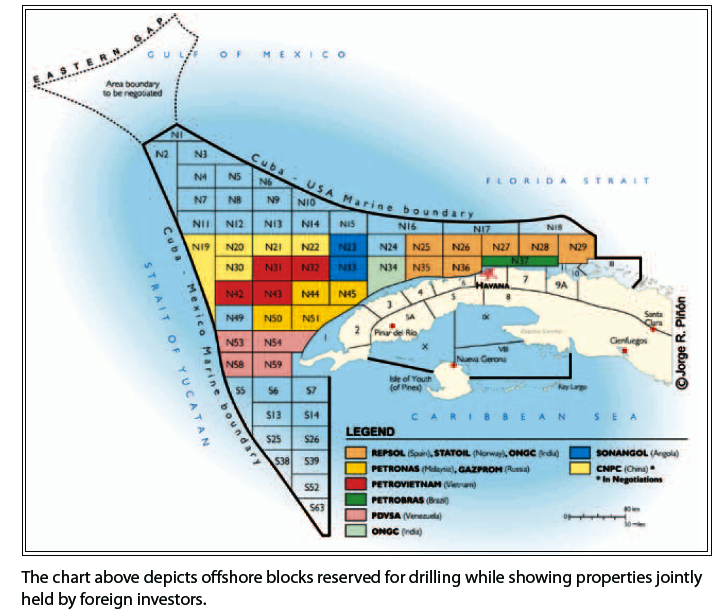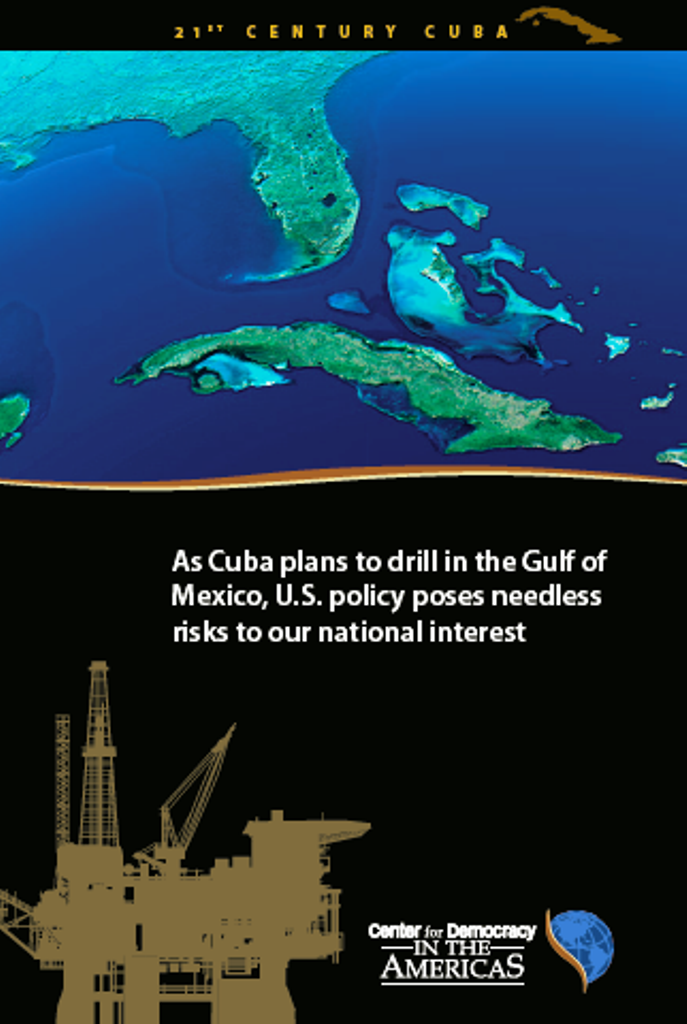The Center for Democracy in the Americas’ Cuba Program has published a thorough exploration of Cuba’s petroleum exploration plans and prospects and the implications for United Sates” policy towards Cuba generally and in the oil sector more specifically.It is the most thorough and well-balanced assessment of this issue that I have seen. (Apologies for not getting some publicity out on this work earlier.)
Here is a hyperlink to the study. The Preface and the last coupleof Concluding comments are als presented beliw.
As Cuba plans to drill in the Gulf of Mexico, U.S. policy poses needless risks to our national interest
The Center for Democracy in the Americas’ Cuba Program; February 2011
PREFACE
This year Cuba and its foreign partners will begin drilling for oil in the
Gulf of Mexico. Drilling will take place as close as 50 miles from Florida
and in sites deeper than BP’s Macondo well, where an explosion in April 2010
killed 11 workers and created the largest oil spill ever in American waters.
Undiscovered reserves of approximately 5 billion barrels of oil and 9 trillion
cubic feet of natural gas lie beneath the Gulf of Mexico in land belonging
to Cuba, according to the U.S. Geological Survey, although Cuba’s estimates
contain higher figures. The amount actually recoverable remains to be seen.
Finding oil in commercially viable amounts would be transformative for
Cuba. Revenues from natural resource wealth have the potential to provide
long-sought stability for Cuba’s economy and are likely to significantly alter
its relations with Venezuela and the rest of Latin America, Asia and other
leading energy producing and consuming nations. Discoveries of commercially
viable resources would also have an enormous impact upon the Gulf
environment shared by Cuba and the United States.
The U.S. embargo against Cuba, a remnant of the Cold War, is an obstacle
to realizing and protecting our interests in the region. Not only does it prohibit
U.S. firms from joining Cuba in efforts to extract its offshore resources, thus
giving the competitive advantage to other foreign firms, but it also denies
Cuba access to U.S. equipment for drilling and environmental protection—an
especially troubling outcome in the wake of the disastrous BP spill. The embargo compels Cuba’s foreign partners to go through contortions—such
as ordering a state of the art drilling rig built in China and sailing it roughly
10,000 miles to Cuban waters—to avoid violating the content limitations
imposed by U.S. law.
Most important, due to the failed policy of isolating Cuba, the United
States cannot engage in meaningful environmental cooperation with Cuba
while it develops its own energy resources. Our government cannot even
address the threat of potential spills in advance from the frequent hurricane
activity in the Gulf or from technological failures, either of which could put
precious and environmentally sensitive U.S. coastal assets—our waters, our
fisheries, our beaches—at great peril.
The risks begin the moment the first drill bit pierces the seabed, and
increase from there. Yet, our policy leaves the Obama administration with
limited options:
• It could do nothing.
• It could try to stop Cuba from developing its oil and natural gas, an alternative
most likely to fail in an energy-hungry world, or
• It could agree to dialogue and cooperation with Cuba to ensure that drilling
in the Gulf protects our mutual interests.
Since the 1990s, Cuba has demonstrated a serious commitment to protecting
the environment, building an array of environmental policies, some based
on U.S. and Spanish law. But it has no experience responding to major
marine-based spills and, like our country, Cuba has to balance economic
and environmental interests. In this contest, the environmental side will
not always prevail.
Against this backdrop, cooperation and engagement between Cuba and
the United States is the right approach, and there is already precedent for it.
During the BP crisis, the U.S. shared information with Cuba about the
spill. The administration publicly declared its willingness to provide limited
licenses for U.S. firms to respond to a catastrophe that threatened Cuba. It also
provided visas for Cuban scientists and environmental officials to attend an
important environmental conference in Florida. For its part, Cuba permitted
a vessel from the National Oceanic and Atmospheric Administration to look for damage in Cuban waters. But these modest measures, however welcome,
are not sufficient, especially in light of Cuba’s imminent plans to drill.
Under the guise of environmental protection, Reps. Ileana Ros-Lehtinen
and Vern Buchanan, Members of the U.S. Congress from Florida, introduced
bills to impose sanctions on foreign oil companies and U.S. firms that help
Cuba drill for oil, and to punish those foreign firms by denying them the right
to drill in U.S. waters. This legislation would penalize U.S. firms and anger
our allies, but not stop Cuba from drilling, and will make the cooperation to
protect our mutual coastal environment more difficult should problems occur.
Energy policy and environmental protection are classic examples of
how the embargo is an abiding threat to U.S. interests. It should no longer
be acceptable to base U.S. foreign policy on the illusion that sanctions will
cause Cuba’s government to collapse, or to try to stop Cuba from developing
its oil resources. Nor should this policy or the political dynamic that sustains
it prevent the U.S. from addressing both the challenges and benefits of Cuba
finding meaningful amounts of oil in the Gulf of Mexico.
The path forward is clear. The Obama administration should use its
executive authority to guarantee that firms with the best equipment and
greatest expertise are licensed in advance to fight the effects of an oil spill.
The Treasury Department, which enforces Cuba sanctions, should make clear
to the private sector that efforts to protect drilling safety will not be met with
adverse regulatory actions. The U.S. government should commit to vigorous
information sharing with Cuba, and open direct negotiations with the Cuban
government for environmental agreements modeled on cooperation that
already exists with our Canadian and Mexican neighbors.
Most of all, the administration should replace a policy predicated on Cuba
failing with a diplomatic approach that recognizes Cuba’s sovereignty. Only
then will our nation be able to respond effectively to what could become a
new chapter in Cuba’s history and ours.
There is little time and much to do before the drilling begins.
Sarah Stephens; Executive Director
RECOMMENDATIONS (7 to 9)
Accept the Reality of Cuba’s Oil Program
7. The United States is served by an economically stable Cuba.
Cuba is currently undertaking significant economic reforms. It has announced
layoffs for 500,000 state workers and proposed economic reforms to enable
Cuba’s nascent private sector to absorb them. More Cubans working in the
private economy will provide more Cubans with greater personal autonomy.
If Cuba is able to develop its hydrocarbon reserves in a manner that places
the Cuban economy on a more sustainable footing, this could lessen the
possibility of another migration crisis or other forms of instability.
Cuba’s economic plans include its vision for oil. As Lisa Margonelli said at
the National Foreign Trade Council, “Cuba has an elaborate plan to be a port,
to be a source for refined products, to serve as a bonded warehouse for the
distribution of goods throughout the region. Despite being a small country,
they are thinking about energy and their economic future in a big way.”
Economies dependent on the extraction of natural resources are often
unsuccessful. Finding oil can be a double-edged sword. Cuba having foreign partners will help them guide the process of incorporating these resources
into its economy over time. Given the time required to monetize the oil,
Cuba should aim for having healthier economic and political institutions
operating before the oil money starts to flow.
8. Cuba’s potential contribution to the regional energy market could be valuable to the U.S.
Professor Soligo cites several benefits to the United States if Cuba is able to
realize the potential of its oil resources in the Gulf of Mexico. In his remarks
at the National Foreign Trade Council, Professor Soligo said, “Whoever
develops these resources it would be good for the United States.”
For example, Professor Soligo observed that Cuba has the potential to
develop an ethanol industry, and the U.S. cannot meet its ethanol targets
without imports. Policy changes would be required to allow Cuba access
to the U.S. market, and would provide substantial environment and energy
policy benefits were they to be made. While Cuba has opposed using corn
for ethanol, it has the resources to produce cellulosic material in its place.
Lisa Margonelli observes, “It is in U.S. interests to create fair price
competition for Cuban oil rather than forcing them into one-buyer fixed
price contracts with China. Securing the flow of more oil into the world
spot market has been one of the few effective American responses to OPEC’s
pricing power since 1979.”
9. U.S. policy should welcome the geo-political changes oil could
usher in.
Cuba is unlikely to disassociate itself from Venezuela or China regardless of
what the U.S. does. Still, Cuba’s post-revolutionary history is defined, in part,
by its dependence on the former Soviet Union and later on Venezuela, and
the development of its offshore resources could give the island’s economy
greater independence than it has enjoyed to date.
If Cuba were no longer dependent on Venezuela, and the U.S. engaged
in cooperative efforts on oil and the environment, we would be establishing
deeper and more positive ties with Cuba’s government and signal to its citizens
that we have a stake in their success.
as c uba p lans t o dr ill, u.s. p olicy p uts our nat ional interest at r isk
10. U.S. policy toward Cuba should no longer be predicated on Cuba failing.
For more than 50 years, U.S. policy toward Cuba has been predicated on
regime change; the Cuban government being overthrown, or being strangled
into submission by U.S. sanctions or the pressure of diplomatic isolation.
It should no longer be acceptable to base U.S. foreign policy on the illusion
that sanctions will cause Cuba’s government to collapse, or even stop
Cuba from developing its oil resources. Nor should the inertia exhibited by
this policy or the political dynamic that sustains it prevent the U.S. from
addressing both the challenges and benefits of Cuba finding meaningful
amounts of oil in the Gulf of Mexico.
The embargo imposes real constraints on the government’s ability to
protect our nation against the potentially grave consequences of an environmental
disaster linked to drilling for oil in the Gulf of Mexico by Cuba
and its foreign partners.
As one expert told us, “Cuba is a country with whom we have virtually
no diplomatic or commercial relations. If a well gets out of control, we have
no genuinely effective recourse if we’re waiting for a transition in Cuba’s
government to occur.”
If Cuba brings commercially viable amounts of oil out of the Gulf, the
embargo becomes even more irrelevant than it is today. How should the U.S.
respond, especially now that drilling in 2011 is a fait accompli and will take
place approximately 50 miles from our shores?
The U.S. should respond by changing the policy, in the ways we describe
here, so the national interest of the United States can be realized and protected.



